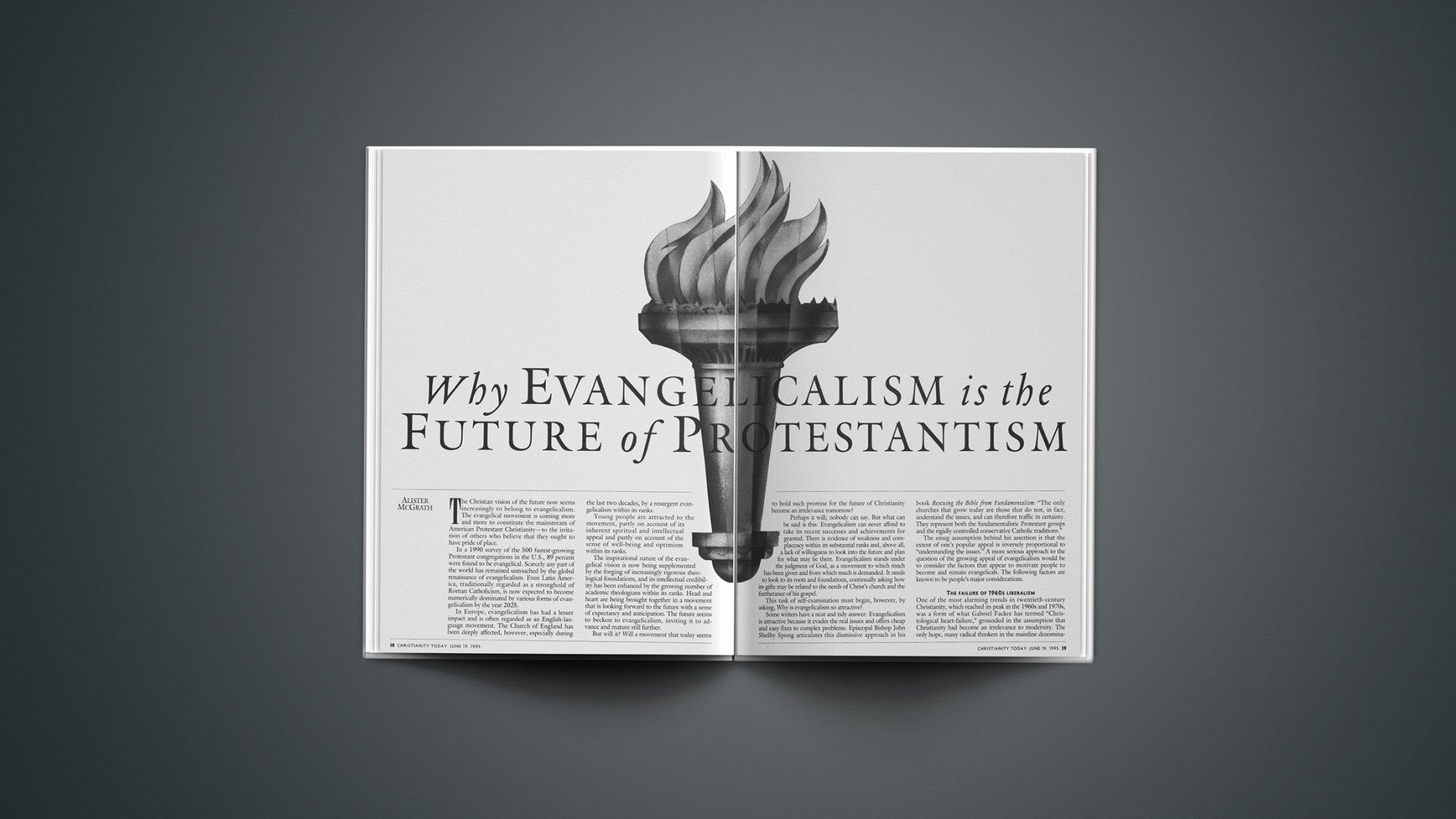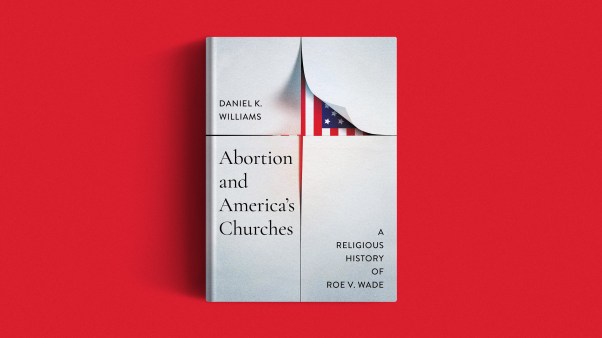The Christian vision of the future now seems increasingly to belong to evangelicalism. The evangelical movement is coming more and more to constitute the mainstream of American Protestant Christianity-to the irritation of others who believe that they ought to have pride of place.
In a 1990 survey of the 500 fastest-growing Protestant congregations in the U.S., 89 percent were found to be evangelical. Scarcely any part of the world has remained untouched by the global renaissance of evangelicalism. Even Latin America, traditionally regarded as a stronghold of Roman Catholicism, is now expected to become numerically dominated by various forms of evangelicalism by the year 2025.
In Europe, evangelicalism has had a lesser impact and is often regarded as an English-language movement. The Church of England has been deeply affected, however, especially during the last two decades, by a resurgent evangelicalism within its ranks.
Young people are attracted to the movement, partly on account of its inherent spiritual and intellectual appeal and partly on account of the sense of well-being and optimism within its ranks.
The inspirational nature of the evangelical vision is now being supplemented by the forging of increasingly rigorous theological foundations, and its intellectual credibility has been enhanced by the growing number of academic theologians within its ranks. Head and heart are being brought together in a movement that is looking forward to the future with a sense of expectancy and anticipation. The future seems to beckon to evangelicalism, inviting it to advance and mature still further.
But will it? Will a movement that today seems to hold such promise for the future of Christianity become an irrelevance tomorrow?
Perhaps it will; nobody can say. But what can be said is this: Evangelicalism can never afford to take its recent successes and achievements for granted. There is evidence of weakness and complacency within its substantial ranks and, above all, a lack of willingness to look into the future and plan for what may lie there. Evangelicalism stands under the judgment of God, as a movement to which much has been given and from which much is demanded. It needs to look to its roots and foundations, continually asking how its gifts may be related to the needs of Christ’s church and the furtherance of his gospel.
This task of self-examination must begin, however, by asking, Why is evangelicalism so attractive?
Some writers have a neat and tidy answer: Evangelicalism is attractive because it evades the real issues and offers cheap and easy fixes to complex problems. Episcopal Bishop John Shelby Spong articulates this dismissive approach in his book “Rescuing the Bible from Fundamentalism:” “The only churches that grow today are those that do not, in fact, understand the issues, and can therefore traffic in certainty. They represent both the fundamentalistic Protestant groups and the rigidly controlled conservative Catholic traditions.”
The smug assumption behind his assertion is that the extent of one’s popular appeal is inversely proportional to “understanding the issues.” A more serious approach to the question of the growing appeal of evangelicalism would be to consider the factors that appear to motivate people to become and remain evangelicals. The following factors are known to be people’s major considerations.
THE FAILURE OF 1960S LIBERALISM
One of the most alarming trends in twentieth-century Christianity, which reached its peak in the 1960s and 1970s, was a form of what Gabriel Fackre has termed “Christological heart-failure,” grounded in the assumption that Christianity had become an irrelevance to modernity. The only hope, many radical thinkers in the mainline denominations believed, lay in modernizing Christianity.
Yet this modernizing does not seem to have taken the form of a considered appraisal of how the central elements of the Christian faith might be related to the needs and aspirations of modern society. Rather, it appears to have proceeded on the assumption that there was an urgent need to jettison any aspect of the Christian faith that caused people problems-such as the idea of a transcendent God.
Much radical theological writing of the 1960s seems to have been based on the assumption that the new cultural trends of the period were permanent changes in Western culture. Yet, looking back, we can see that this period merely witnessed a temporary change of cultural mood.
While sixties-style theology aimed to transform culture, the reverse was achieved: Christianity became transformed by culture, becoming little more than a pale and vaguely religious reflection of secular cultural trends. Furthermore, it soon became clear that culture was changing rapidly, constantly outpacing those who tried to keep up with its whims and fads.
Peter L. Berger comments in A Far Glory, “Our pluralistic culture forces those who would ‘update’ Christianity into a state of permanent nervousness. The ‘wisdom of the world’ … varies from one social location to another; what is worse, even in the same locale it keeps on changing, often rapidly. … The wisdom of the world today always has a sociological address.”
It is thus virtually meaningless to talk about “making Christianity relevant to the modern world.” This implies that there is only one “modern world,” whereas there are many modern worlds. Every attempt to accommodate Christianity to the beliefs of one social grouping distances it from those of another.
The end result of this approach to Christianity is depressingly clear. Where this effort hoped to make mainline Christianity credible to secularists, it ended up making secularism credible to mainline Christians.
Evangelicalism believes that to be right is to be relevant. It is too easy to produce a spurious relevance in response to secular pressures. The task of Christian apologetics is to bring out the inherent attraction of the gospel by being faithful and responsible in our proclamation and presentation. In other words, the best way of ensuring that Christianity remains relevant to the modern world is to be faithful to Christian orthodoxy and articulate the faith in terms intelligible to the world.
Evangelicalism regards itself under an obligation to remain faithful to the evangel, something that cannot and must not be compromised. It thus represents a form of Christianity that is sufficiently resilient to resist pressures to conform to its secular context and yet sufficiently attractive to provide a pressure of its own by which individuals may be drawn out of secular culture to Christian communities.
Given that secularization is likely to continue within Western culture, the future of Christianity may come increasingly to depend on evangelicalism and other versions of Christianity that retain insights that distinguish them from secular culture, while simultaneously providing an attractive alternative to it. The very public failure of liberalism has led many to look around for a version of Christianity that makes sense and stays faithful to the gospel-and so they have turned to evangelicalism.
EVANGELICALISM IS ORTHODOX CHRISTIANITY
Evangelicalism is historic Christianity. Its beliefs correspond to the central doctrines of the Christian churches down the ages, including the two most important doctrines of the patristic period: the doctrine of the “two natures,” human and divine, of Jesus Christ and the doctrine of the Trinity. In its vigorous defense of the biblical foundations, theological legitimacy, and spiritual relevance of these doctrines, evangelicalism has shown itself to have every right to claim to be a modern standard bearer of historic, orthodox Christianity.
As many dedicated Christians inside the mainline denominations in North America are discovering to their outrage, the commitment of those denominations to these historic doctrines is often less than wholehearted. This has led both to an increasing exodus from these churches toward explicitly evangelical denominations and to growth in the evangelical tendencies within the denominations. The continuing growth of the Southern Baptist Convention and of evangelicalism within the Church of England illustrates these trends.
Another result is the formation of breakaway evangelical churches from mainline denominations. The formation of the Presbyterian Church in America (PCA) in 1973 is a case in point. The PCA was formed as a result of disillusionment with the headlong rush toward theological liberalism in the mainline Presbyterian church. Since 1973, its membership has grown from 40,000 to 217,000 members-and is still increasing.
People are voting with their feet by walking out of liberalism toward orthodoxy. If they stay inside a mainline denomination, it is usually in the hope of winning it over for the cause of orthodoxy-an approach that was adopted in relation to the Church of England back in the 1960s, with considerable success.
Many leaders within the mainline denominations received their theological education during the 1960s and 1970s, and some appear to have accepted uncritically the dominant liberal theological trends of that period. They seem unaware that such liberalism is now widely regarded as passe in academic circles and incapable of sustaining churches in a relentlessly secularist society. They seem to be trapped in a liberal time warp where all is sweetness, roses, light, and 1960s optimism. Liberalism may stimulate the mind; it cannot sustain a church.
There are now strong pressures within most mainstream denominations to abandon the failed experiments of the last two or three decades and return to the foundations of orthodox Christianity. Opponents of this trend, unable to comprehend this development, often mock it as a “scared fundamentalism,” a “search for security,” or a “quest for the certitudes of nostalgia.” Whatever it is, it is certainly a reaction against the failures of a past generation and a desire to put the churches back on the road to integrity, growth, and relevance.
Yet this road does not entail compromising orthodoxy. Liberalism believed that you had to change Christianity to make it acceptable. Orthodoxy believes that the gospel stays the same; we need rather to find better and more effective ways of presenting it. Christianity does not need to be made attractive; it is attractive. If there has been a failure in this regard, it is that Christians have failed to appreciate this attraction for themselves and to take the trouble to explain it to others.
The ways in which an uncompromising, orthodox gospel can be made more relevant to modern society are illustrated by a series of experiments in the Western world that have sought to eliminate all alienating factors that are not essential to the gospel itself. For example, many people are initially alienated from Christianity by the strangeness of traditional Christian worship-Tudor music, an eighteenth-century liturgy, and clergy dressed in the style of sixteenth-century England. For some inside the churches, these are important and precious symbols of historical continuity; for most outside the church, they are evidence of an outdated and irrelevant gospel. And so the gospel is rejected on account of the cultural unacceptability of nonessential, perhaps even marginal, aspects of Christian worship!
Willow Creek Community Church near Chicago is an excellent example of a church that has pioneered an approach that breaks down these incidental barriers. The church auditorium has none of the traditional ecclesiastical trappings: no pulpit, no organ, no hymnals, and no traditional clerical vestments. Yet the gospel is proclaimed effectively. While this approach has its critics, there is no doubt that this church and an increasing number of imitators throughout the Western world are getting a hearing for the gospel among those who would regard a traditional church setting as a no-go zone.
EVANGELICALISM MAKES SENSE
One of the most important developments within evangelicalism since World War II is an outbreak of confidence in its own intellectual credentials. In the old days, evangelicalism was widely seen as strictly for the uneducated and illiterate, an impression that was reinforced by the intellectual fallout from the Scopes trial (1925). “No thinking man can take evangelicalism seriously” was the (noninclusive) watchword of much liberal academic theology in the immediate postwar period. Indeed, academic integrity was widely seen as the exclusive prerogative of liberal writers, who encouraged the view that a concern for the contemporary intellectual climate is a unique, or even a defining, feature of liberalism.
Yet Thomas Aquinas took seriously the Aristotelianism of the thirteenth-century University of Paris in writing both his Summa Contra Gentiles and Summa Theologiae. I have yet to find Aquinas described as a liberal for that reason!
Today, one of the most significant contributions to the modern philosophy of religion comes from a group of American writers, including Alvin Plantinga and Nicholas Wolterstorff. Their discussion of the theme of “faith and rationality” has become a landmark in recent debates centering on this theme. Yet the group has no inclination whatsoever toward liberalism; instead, it represents what one might call the classic Reformed approach, drawing its inspiration from the writings of John Calvin.
In short, there is nothing distinctively “liberal” about being academically serious and culturally informed. Through the work of philosophers such as C. Stephen Evans and theologians such as Thomas C. Oden, James I. Packer, Carl Henry, and David F. Wells, evangelicalism is now well on its way to gaining an academic credibility and respectability that would have been unthinkable a generation ago.
Although the Lutheran and Wesleyan traditions have made important contributions to evangelicalism as a whole, it is generally agreed that the renewed intellectual confidence within evangelicalism owes no small debt to its Reformed heritage. The rediscovery of the contemporary relevance of the great Puritan writer Jonathan Edwards has been one of the most important landmarks in this rehabilitation of evangelical theology and has given evangelicalism a new confidence in its own heritage. There is new interest in the writings and ideas of the Old Princeton School, which gave nineteenth-century American evangelicalism an intellectual resilience that persisted until the rise of modernism in the 1920s diverted evangelicalism into countercultural measures of an often anti-intellectual nature. The Reformed Theology conferences organized by James M. Boice (Philadelphia) ensure the continuing high profile of this tradition in North America in a manner that parallels the Puritan conferences of the late 1950s and early 1960s, organized in London by Packer and Martyn Lloyd-Jones.
The foundation of the Evangelical Theological Society has been an important element in this consolidation of academic excellence, as has the growing academic presence and reputation of leading evangelical centers of scholarship and research, such as Fuller Theological Seminary, Reformed Theological Seminary, Regent College (Vancouver), Trinity Evangelical Divinity School (now Trinity International University), and Westminster Theological Seminary. The emergence of these centers is partly a response to the realization that evangelicalism requires excellent academic credentials if it is to consolidate existing advances and prepare for those that lie ahead.
While there are reasons for being concerned about the long-term future of this intellectual renaissance, the present turnabout in the academic reputation of evangelicalism seems undeniably hopeful, provided appropriate measures are taken to ensure its continuation.
Copyright © 1995 Christianity Today. Click for reprint information.
ctjun95mrw5T718a566b










